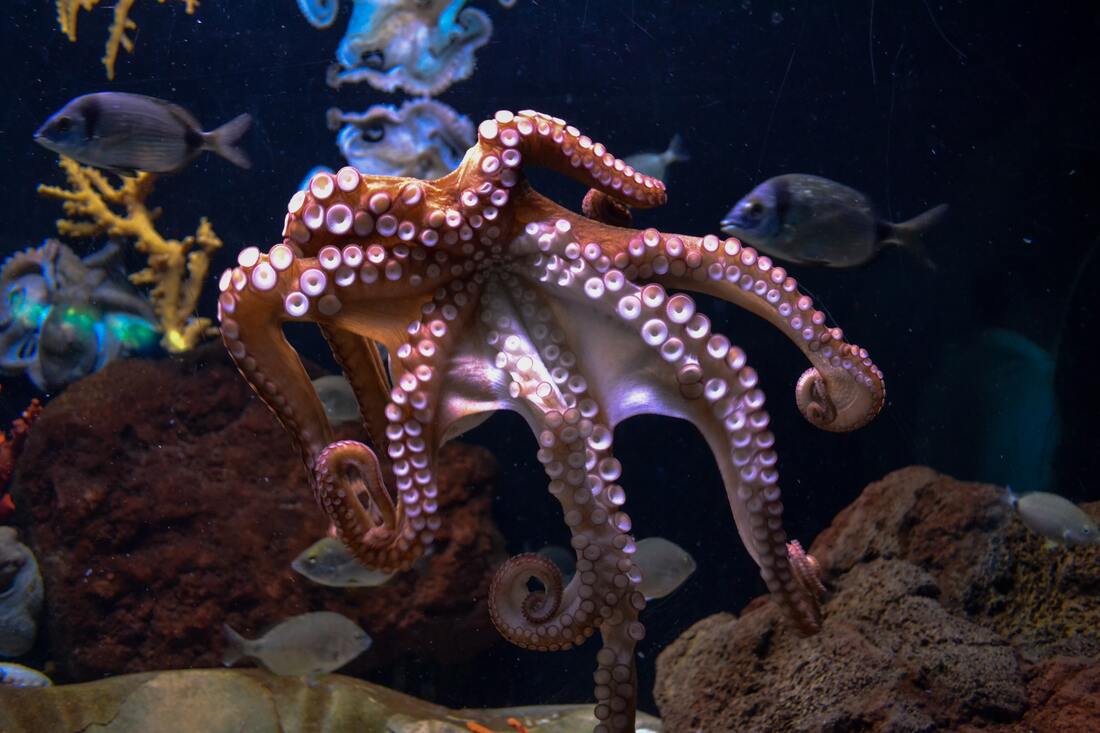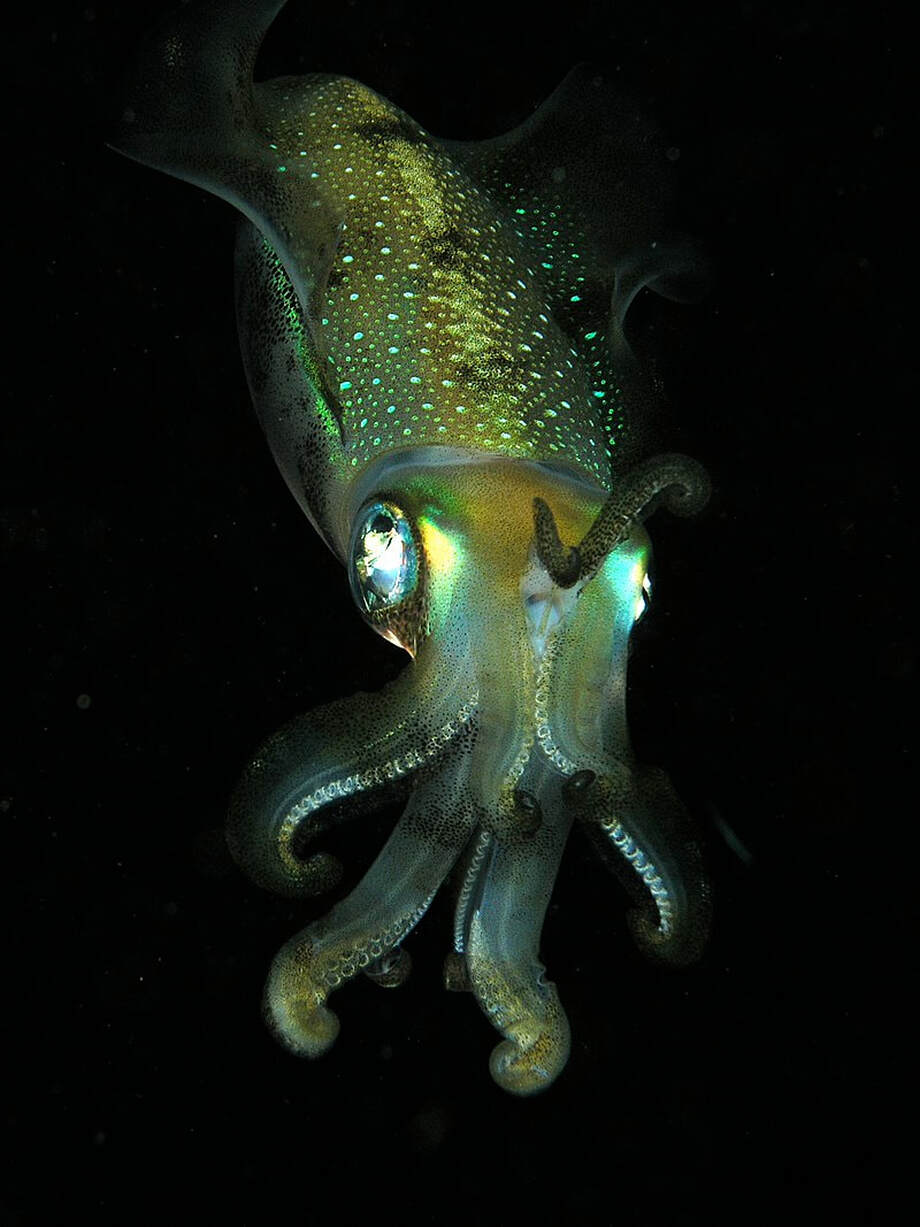God's Love for the Octopus
An Open and Relational Appreciation of Cephalopods
"The octopus, the squid, the nautilus and the cuttlefish are some of the most extraordinary creatures on this planet, intelligent and yet apparently unlike other life forms. They are cephalopods and are part of the mollusc family like snails and clams, and they have some characteristics in common with those. What sets them apart is the way members of their group can change colour, camouflage themselves, recognise people, solve problems, squirt ink, power themselves with jet propulsion and survive both on land, briefly, and in the deepest, coldest oceans. And, without bones or shells, they grow so rapidly they can outstrip their rivals when habitats change, making them the great survivors and adaptors of the animal world." (BBC, In Our Time)
An open and relational approach to the cephalopods begins with wonder, fascination, curiosity, and a sense of mystery, They are, after all, mysterious to us, even as they are our creaturely kin. Whatever is mysterious is always a little scary, and that includes cephalopods. And yet they are like us in so many ways, even as they look so different; and they also have many skills we lack. We may wish that we could camouflage ourselves as they can, or change colors, or jet propel ourselves away from difficult situations. And it would be nice to be as coordinated as they are, with eight arms that can move in different directions like the octopus. They are better movers, better dancers, than most of us, and in their dancing they know modes of movement we can hardly understand. Whatever our feelings about them, they are our teachers.
Cephalopods challenge our anthropocentric view of the world and force us to re-examine our assumptions about what it means to be intelligent, conscious, and aware. They demonstrate that intelligence can take many forms, and that there are many ways of being in the world. Cephalopods also inspire wonder and awe in us, reminding us of the beauty and complexity of the natural world. They invite us to explore the mysteries of the ocean and the life forms that inhabit it, and to deepen our sense of connection and belonging to the wider web of life on Earth.
Cephalopods provide an opportunity to reimagine our understanding of God in more open and relational terms. If we conceive of God as all-loving and amipotent, as Thomas Oord suggests, we must recognize that divine love extends to and is receptive of the lives of individual cephalopods, including their inner lives, emotions, ideas, and forms of awareness, whether conscious or unconscious. The love of God serves as an inwardly felt lure for cephalopods to survive and thrive in their respective situations, and divine empathy is receptive of their experiences, allowing God to feel what it is like to be a cephalopod and share in their experiences of harmony, intensity, pleasure, pain, confusion, and zest.
It is worth noting that this applies to all creatures, not just cephalopods. The amipotence of God is not merely a love for the abstract concept of "nature" or even the abstract notion of "cephalopods." Rather, it is a love for individual sentient beings that contribute to making God "God." God is not a singular entity standing above the many, but rather, the universe's many facets "becoming one" in God's life. At least this is how open and relational theologians in the process tradition think. Just as loving parents cannot separate their lives from their children's, God cannot separate God's life from the creatures that God loves. Cephalopods, among others, are an integral part of God's life, adding to God's life in ways different from ways that we humans might do the same.
If we learn to think in these ways about God, we are better able to live in ways sorely needed in our time, "Ecological civilizations" need people who love one another and whose horizons have been expanded so that they recognize, in humility, the value of other creatures, even if those creatures are alien to what we humans easily understand. Even if God did not exist, they would still have value in and for themselves, But they have value for God, too, as subjects of their own lives. What we call aliens, God calls beloved.
Needless to say, this lesson extends to other kinds of aliens, too: those fellow humans who are seen as strange and different, and any extraterrestrials that might likewise exist, The horizons of divine love, of amipotence, are so much wider and more inclusive than we imagine. With help from cephalopodic kin, and a host of other creatures, may our horizons grow more godly,
- Jay McDaniel
An open and relational approach to the cephalopods begins with wonder, fascination, curiosity, and a sense of mystery, They are, after all, mysterious to us, even as they are our creaturely kin. Whatever is mysterious is always a little scary, and that includes cephalopods. And yet they are like us in so many ways, even as they look so different; and they also have many skills we lack. We may wish that we could camouflage ourselves as they can, or change colors, or jet propel ourselves away from difficult situations. And it would be nice to be as coordinated as they are, with eight arms that can move in different directions like the octopus. They are better movers, better dancers, than most of us, and in their dancing they know modes of movement we can hardly understand. Whatever our feelings about them, they are our teachers.
Cephalopods challenge our anthropocentric view of the world and force us to re-examine our assumptions about what it means to be intelligent, conscious, and aware. They demonstrate that intelligence can take many forms, and that there are many ways of being in the world. Cephalopods also inspire wonder and awe in us, reminding us of the beauty and complexity of the natural world. They invite us to explore the mysteries of the ocean and the life forms that inhabit it, and to deepen our sense of connection and belonging to the wider web of life on Earth.
Cephalopods provide an opportunity to reimagine our understanding of God in more open and relational terms. If we conceive of God as all-loving and amipotent, as Thomas Oord suggests, we must recognize that divine love extends to and is receptive of the lives of individual cephalopods, including their inner lives, emotions, ideas, and forms of awareness, whether conscious or unconscious. The love of God serves as an inwardly felt lure for cephalopods to survive and thrive in their respective situations, and divine empathy is receptive of their experiences, allowing God to feel what it is like to be a cephalopod and share in their experiences of harmony, intensity, pleasure, pain, confusion, and zest.
It is worth noting that this applies to all creatures, not just cephalopods. The amipotence of God is not merely a love for the abstract concept of "nature" or even the abstract notion of "cephalopods." Rather, it is a love for individual sentient beings that contribute to making God "God." God is not a singular entity standing above the many, but rather, the universe's many facets "becoming one" in God's life. At least this is how open and relational theologians in the process tradition think. Just as loving parents cannot separate their lives from their children's, God cannot separate God's life from the creatures that God loves. Cephalopods, among others, are an integral part of God's life, adding to God's life in ways different from ways that we humans might do the same.
If we learn to think in these ways about God, we are better able to live in ways sorely needed in our time, "Ecological civilizations" need people who love one another and whose horizons have been expanded so that they recognize, in humility, the value of other creatures, even if those creatures are alien to what we humans easily understand. Even if God did not exist, they would still have value in and for themselves, But they have value for God, too, as subjects of their own lives. What we call aliens, God calls beloved.
Needless to say, this lesson extends to other kinds of aliens, too: those fellow humans who are seen as strange and different, and any extraterrestrials that might likewise exist, The horizons of divine love, of amipotence, are so much wider and more inclusive than we imagine. With help from cephalopodic kin, and a host of other creatures, may our horizons grow more godly,
- Jay McDaniel


